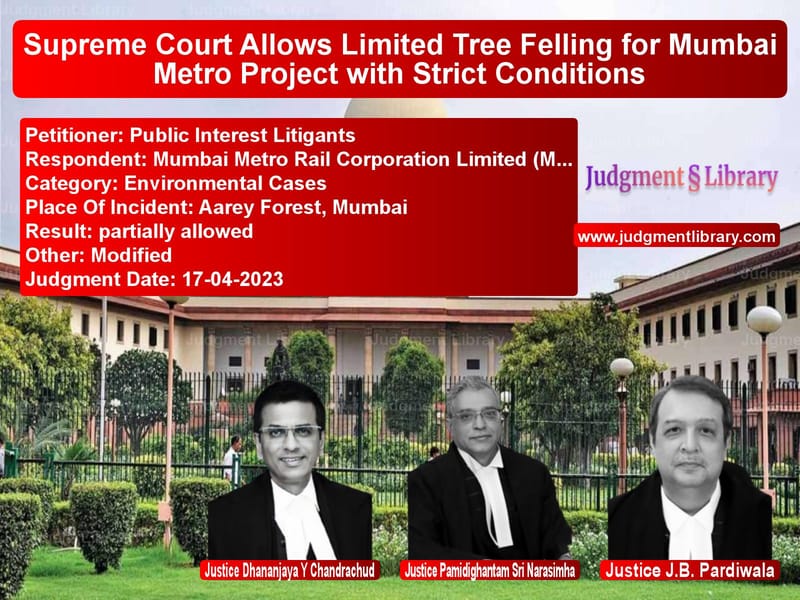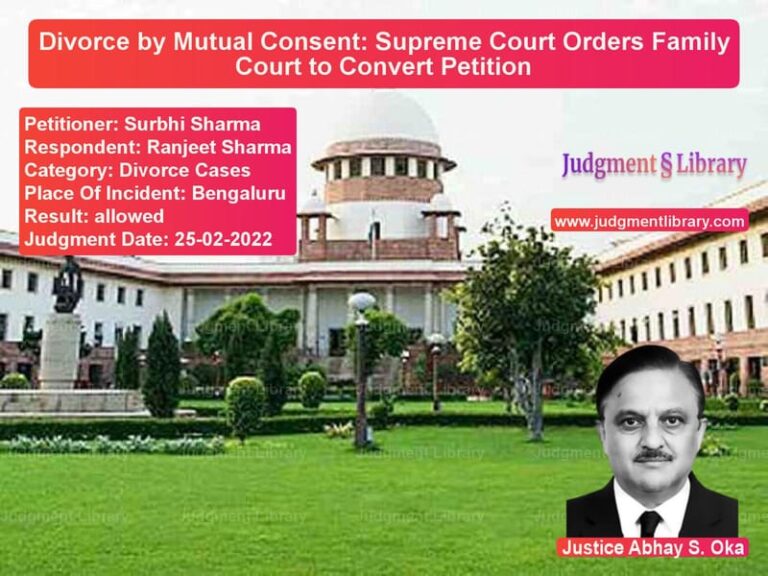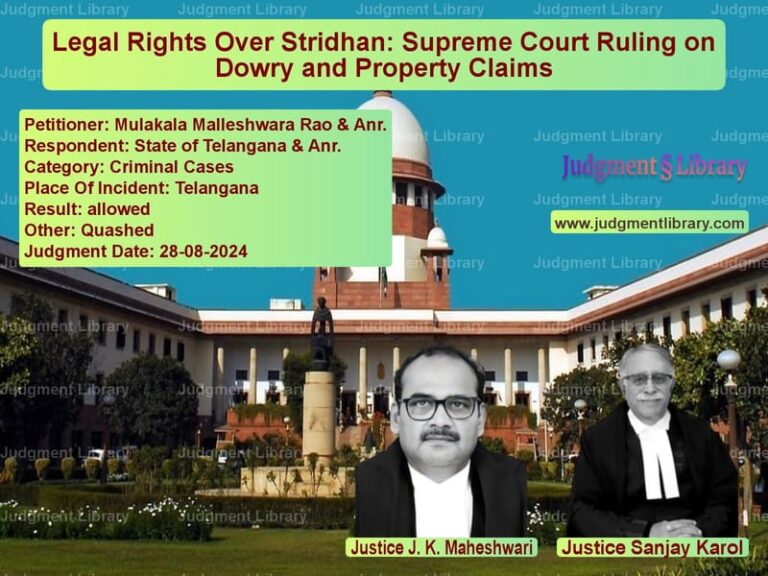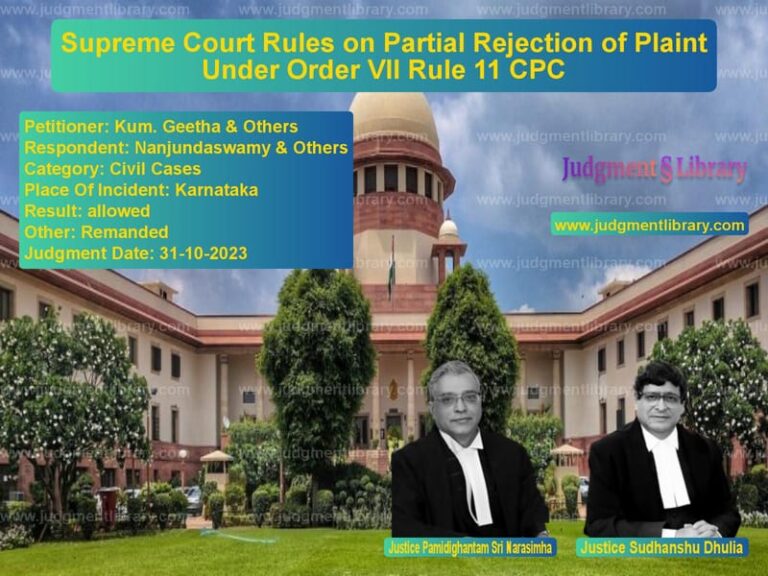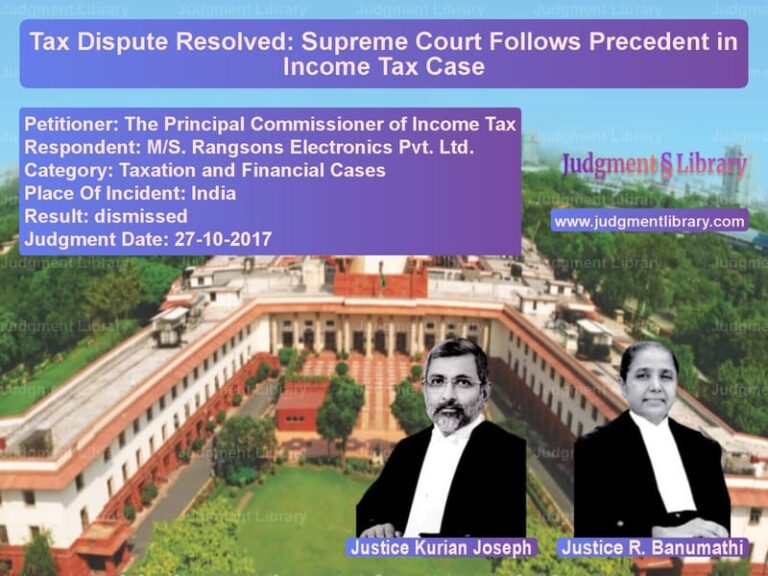Supreme Court Allows Limited Tree Felling for Mumbai Metro Project with Strict Conditions
The Supreme Court of India recently ruled on the controversial Aarey Forest issue, which involved the felling of trees for the Mumbai Metro Line-3 project. The case, titled In Re: Felling of Trees in Aarey Forest (Maharashtra), examined whether the Mumbai Metro Rail Corporation Limited (MMRCL) had overstepped its permissions for tree felling and whether additional trees could be cut for the project. The Court, while criticizing MMRCL’s conduct, allowed limited felling of trees under strict conditions.
Background of the Case
The case began as a public interest litigation (PIL) concerning the felling of trees in Aarey Colony, a significant green space in Mumbai. The area was proposed to be used for constructing a Metro Car Shed for Mumbai Metro Line-3.
Initially, the Supreme Court had ordered a status quo on tree felling. However, on November 29, 2022, the Court allowed MMRCL to apply to the Tree Authority for permission to cut 84 trees. MMRCL later sought permission to cut 185 trees, which led to legal challenges.
Key Issues Before the Supreme Court
The Court examined three major issues:
- Did MMRCL act beyond its permitted scope by seeking to cut additional trees?
- Should the Supreme Court allow additional tree felling for the Metro Car Shed?
- What measures should be imposed to ensure environmental compliance?
Arguments by the Petitioner (Public Interest Litigants)
The public interest litigants argued:
- Violation of Supreme Court’s Order: MMRCL was initially permitted to seek approval for only 84 trees but later sought permission for 185 trees.
- Environmental Impact: Aarey Forest is a vital ecological space in Mumbai, and large-scale tree felling would harm the city’s environment.
- Non-Bona Fide Actions by MMRCL: The petitioners claimed that MMRCL had misrepresented facts and attempted to bypass judicial oversight.
Arguments by the Respondents (MMRCL and Mumbai Municipal Corporation)
MMRCL and the Mumbai Municipal Corporation contended:
- Need for Additional Tree Felling: The number of trees had changed over time due to natural growth and environmental factors.
- Metro Project’s Public Importance: The Metro Line-3 project is crucial for Mumbai’s public transportation system and would significantly reduce road congestion and pollution.
- Compensatory Measures: MMRCL promised to plant 1,533 trees to compensate for the removed trees.
Supreme Court’s Ruling
1. MMRCL Acted Improperly
The Court was critical of MMRCL’s approach, stating:
“We are constrained to observe that MMRCL has made an attempt to overreach the jurisdiction of this Court.”
The Court noted that MMRCL should have sought clarification from the Supreme Court before requesting permission to cut additional trees.
2. Permission for Tree Felling with Conditions
Despite MMRCL’s misconduct, the Court recognized the importance of the Metro project and allowed the felling of 177 trees under the following conditions:
- MMRCL must deposit ₹10 lakh with the Conservator of Forests within two weeks.
- The Conservator of Forests must oversee afforestation efforts and report compliance to the Supreme Court.
- A team from IIT Bombay will verify whether proper compensatory afforestation measures are implemented.
3. Strict Environmental Oversight
The Supreme Court directed that the Conservator of Forests and IIT Bombay must ensure that MMRCL complies with afforestation measures. The Court emphasized the importance of environmental protection, stating:
Read also: https://judgmentlibrary.com/supreme-court-overrules-ngt-order-on-land-development-near-teliya-talab/
“Any such direction will have the consequences of bringing the public project to a standstill. Such a course of action would not be desirable.”
Key Excerpt from the Judgment
The Court concluded:
“It was improper on the part of MMRCL to move the Tree Authority for the felling of any trees in excess of 84 trees. If circumstances had transpired which led to a variation in the number of trees to be cut, the only correct course of action would have been to move this Court.”
Conclusion
The Supreme Court’s ruling in the Aarey Forest case reflects a balanced approach between environmental conservation and infrastructure development. While it permitted additional tree felling, it imposed strict conditions to ensure accountability and afforestation.
The judgment highlights the necessity for government agencies to act transparently and comply with judicial orders when implementing large-scale infrastructure projects. The case serves as a precedent for future disputes involving environmental protection and urban development.
Petitioner Name: Public Interest Litigants.Respondent Name: Mumbai Metro Rail Corporation Limited (MMRCL).Judgment By: Justice Dhananjaya Y Chandrachud, Justice Pamidighantam Sri Narasimha, Justice J.B. Pardiwala.Place Of Incident: Aarey Forest, Mumbai.Judgment Date: 17-04-2023.
Don’t miss out on the full details! Download the complete judgment in PDF format below and gain valuable insights instantly!
Download Judgment: public-interest-liti-vs-mumbai-metro-rail-co-supreme-court-of-india-judgment-dated-17-04-2023.pdf
Directly Download Judgment: Directly download this Judgment
See all petitions in Environmental Cases
See all petitions in Judgment by Dhananjaya Y Chandrachud
See all petitions in Judgment by P.S. Narasimha
See all petitions in Judgment by J.B. Pardiwala
See all petitions in partially allowed
See all petitions in Modified
See all petitions in supreme court of India judgments April 2023
See all petitions in 2023 judgments
See all posts in Environmental Cases Category
See all allowed petitions in Environmental Cases Category
See all Dismissed petitions in Environmental Cases Category
See all partially allowed petitions in Environmental Cases Category

